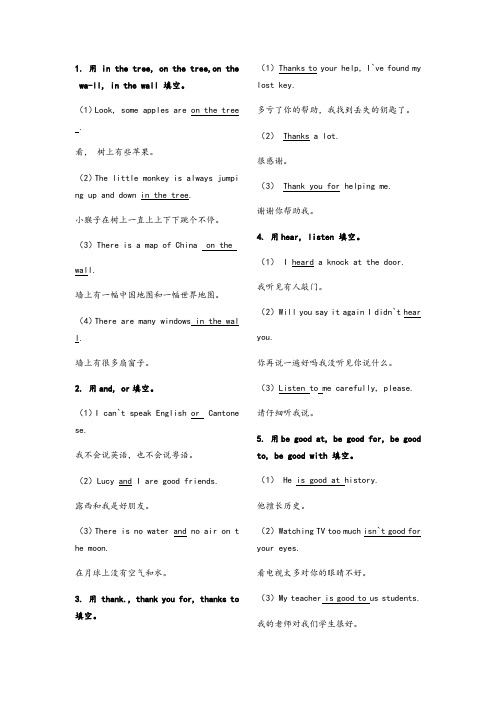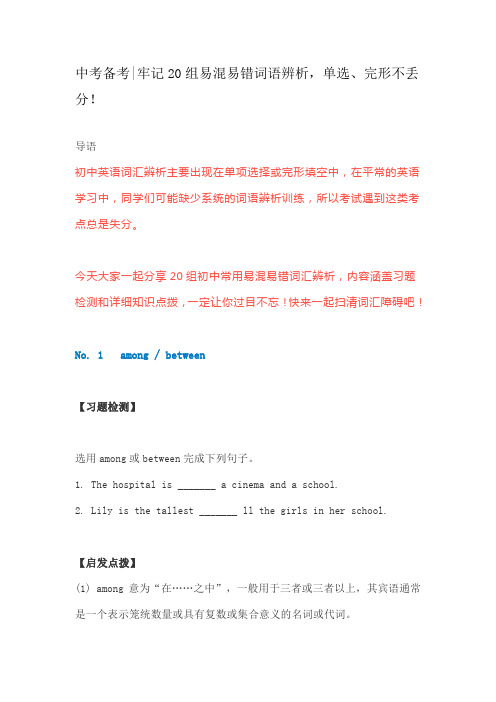初中英语易混词辨析
英语初中常用易混淆单词词组的区别用法

中考初中英语常用易混淆单词词组的区别用法英语常用易混淆单词/词组的区别用法一、how much和how many的区别用法how much和how many的区别:how much用来询问事物的数量,后接不可数名词;how many用来询问事物的数量,后接可数名词复数。
how much和how many的区别1、所修饰词不同how much用来修饰不可数名词,表示数量,也可单独使用。
how many用来修饰可数名词的复数,它的句式是:How many+复数名词+一般疑问句+?例句:How much milk is there in the glass?玻璃杯里有多少牛奶?How many books are there on the desk?有多少本书在桌子上?2、用法不同How much 表示多少钱,用来问价格。
例句:How much is this dress?这个连衣裙多少钱?How many 表示多少,用来问数量。
例句:How many apples do you have?你有多少苹果?二、in和on的区别用法当我们表示某些东西被其他东西所包围时使用“in”这个词。
而“on”用于描述物体被放置在其他物体上方或外部的情况。
in可表时间,表地点,表手段、方法、材料。
on表示时间、地点、方位等。
in和on区别一、意思不同in:prep. 在 ... 里;在 ... 地方;在 ... 期间on:prep. 在 ... 之上二、用法不同in: in着重一段时间的过程,常用于重复动作或延续动作。
in表示从现在时间算起推移到将来的一段时间之后,一般与将来时态连用。
例句:He is a layman in economics.他对经济学一窍不通。
on:表示“在物体的表面上”,只能用on的表达方式有on the next morning,on the following。
例句:The spider is walking on the ceiling.蜘蛛在天花板上爬行。
初中英语易混词、短语辨析

1. 用 in the tree, on the tree,on the wa-ll, in the wall 填空。
(1)Look, some apples are on the tree .看,树上有些苹果。
(2)The little monkey is always jumpi ng up and down in the tree.小猴子在树上一直上上下下跳个不停。
(3)There is a map of China on thewall.墙上有一幅中国地图和一幅世界地图。
(4)There are many windows in the wal l.墙上有很多扇窗子。
2. 用and, or填空。
(1)I can`t speak English or Cantone se.我不会说英语,也不会说粤语。
(2)Lucy and I are good friends.露西和我是好朋友。
(3)There is no water and no air on t he moon.在月球上没有空气和水。
3. 用 thank., thank you for, thanks to 填空。
(1)Thanks to your help, I`ve found my lost key.多亏了你的帮助,我找到丢失的钥匙了。
(2) Thanks a lot.很感谢。
(3) Thank you for helping me.谢谢你帮助我。
4. 用hear, listen 填空。
(1) I heard a knock at the door.我听见有人敲门。
(2)Will you say it again I didn`t hearyou.你再说一遍好吗我没听见你说什么。
(3)Listen to me carefully, please.请仔细听我说。
5. 用be good at, be good for, be good to, be good with 填空。
2023年初中英语词法知识:3类连词易混淆用法归纳

2023年初中英语词法知识:3类连词易混淆用法归纳一、although 与though 用法区别与说明1.用作连词,表示“虽然”,两者大致同义,可换用,只是although 比though 更为正式。
如:Though [Although] they’re expensive, people buy them. 虽然它们很昂贵,人们还是买。
2.although 一般不用作副词,而though 可用作副词,表示“可是”“不过”。
如:I expect you’re right—I’ll ask him, though. 我认为你说得对——我去问问他也好。
She promised to phone. I heard nothing, though. 她答应要打电话来. 可我没听到回信儿。
这样用的though通常位于句末,但有时位于句首的though也有这样的意思。
如:他说他要付钱,然而我认为他不会付的。
正:He says he’ll pay, though I don’t think he will.正:He says he’ll pay; I don’t think he will, though.3.在as though(好像,仿佛),even though(即使,纵然)等固定短语中,不能用although代替though。
如:She treats me as though I were a stranger. 她待我仿佛我是一个陌生人。
He’s the best teacher even though he has the least experience. 他尽管经验最少,但教得最好。
4.两者均可用于省略句,通常见于主句与从句主语相同,且从句谓语含有动词be的情形。
如:Although [Though] (it was) built before the war, the engine is still in perfect order. 尽管是战前制造的,这台发动机仍然处于良好状态。
初中英语易混淆单词及短语简析

p se g r・ a sn es
A. o wih g t C.p a t ly wih
B.h l t ep wih D. a t de lwi h
A.p c p ik u
B.ma e u k p
C. e p g tu
D.s n p edu
“ 助某 人 ” 帮 之义 ;el i d a wt h是 “ 处理 , 付 , 对
涉及 ” 的含义 。
3 一 Mo . m,c n I a
— —
ቤተ መጻሕፍቲ ባይዱ
射, 使上 升 ” 的含义 。
t he TV?1wa tt n o
7 一 W h r r c o l lt e . o y u . e e a e my s h o oh s d o c
思。
6 .~ W h tr l o we h v n te hih y a u e d a e o h g wa ?
一
Bu o tt n h y tId n’ hi k te
c a! ot
h s n w i e
Bu e o c r a e s s r a s r no al we o t l o d t
【 解析 】 正确 的选择应 该是 A。owt g i h在这
儿是 “ … …相 配 , 跟 与… …相 伴” 的意思 ;l pa y wt i h的 意思 是 “ 玩弄 ,戏 耍 ”h l i :epwt h是
【 析 】A 为正 确 答 案 ,有 “ 车 接 载 解 用
( )拿 起 , 起 , 加 ( 人 , 捡 增 速度 ) 的 意思 ; a e ” m k u p有 “ 造 , 成 , 构 , 妆 ” 含 义 ;e 编 组 虚 化 的 gt u p有 “ 床 . 来 ” 意 思 : n p有 “ 起 起 的 s du e 发
英语中考牢记20组易混易错词语辨析

中考备考|牢记20组易混易错词语辨析,单选、完形不丢分!导语初中英语词汇辨析主要出现在单项选择或完形填空中,在平常的英语学习中,同学们可能缺少系统的词语辨析训练,所以考试遇到这类考点总是失分。
今天大家一起分享20组初中常用易混易错词汇辨析,内容涵盖习题检测和详细知识点拨,一定让你过目不忘!快来一起扫清词汇障碍吧!No. 1 among / between【习题检测】选用among或between完成下列句子。
1. The hospital is _______ a cinema and a school.2. Lily is the tallest _______ ll the girls in her school.【启发点拨】(1) among意为“在……之中”,一般用于三者或三者以上,其宾语通常是一个表示笼统数量或具有复数或集合意义的名词或代词。
(2) between一般指两者之间,其宾语通常是表示两者概念的名词或代词,或由and连接的两个具体的人或物。
between有时也可表示多者之中的“两两之间”。
如:Switzerland lies between France, Germany, Austria and Italy.Key:1. between2. amongNo. 2 lay / lie【习题检测】用lay或lie的适当形式完成句子。
1. I _______ the table when my mother cooked the meal.2. John was ill and _______ in bed all morning.【启发点拨】(1) lay作动词,可意为“摆放(餐桌)”,其过去式与过去分词均为laid,现在分词为laying,常用于短语lay the table,意为“摆放餐桌”。
如:Tom was laying the table.(2) lie作动词,意为“躺;平躺”时,过去式为lay,过去分词为lain,现在分词为lying。
初中英语常考易混介词用法辨析

初中英语常考易混介词用法辨析1.表示“大约”的about,around与or so*about表示“大约”时,常与较确定的数字连用,位于数词的前面,多用来表达时间、年龄和日期。
如:It’s about ten o’clock. 现在大约十点。
The girl is about ten years old.*around表示“大约”时,多用于美国英语,常与较确定的数字连用,位于数词的前面,通常用来表达时间、距离、重量、货币等。
如:I’ll be back at around 5 o’clock.The machine weighed around 30 pounds.The company has around $1.3 billion in debt.*or so意思是“大约、上下、左右、差不多”,放在数词的后面,表示时间、日期、数量等的约定范围。
如:We just walked a kilometer or so when it began to rain heavily.2.表示“关于”的about与on*about表示“关于、有关”,指内容较普通,通常涉及日常生产及生活等方面的事宜,侧重于叙事,即关于某方面的事情。
如:Tell him something about your trip.*on表示“关于”时,指严肃的、有研究性的、科研学术上的及国际形势、政治、理论、专著等方面的问题。
如:This is a book on radio.Next we’ll have a lesson on history.3.表示“在......上”的above,over与onabove“在......上方”,表示两者不接触与below(在......下面)相对在......上方在......上在......(正)上above on overbelow beneath under在......下面在......下在......下on“在......上面”,表示两者接触与beneath(在......下)相对over“在......(正)上方”,表示两者垂直,但不接触,也可指“笼罩或覆盖在上面”与under(在......下)相对*above表示“在......的上方”,指某物的位置高出某一物体或另一位置,两物之间不接触,反义词是below。
初中英语考查频率最高的50个短语以及易混易错词汇辨析100组!

初中英语考查频率最高的50个短语以及易混易错词汇辨析100组!1.agree with 同意...的意见(想法)I can’t agree with you about that.就那件事,我无法同意你的看法。
2.1isten to 听…When she arrived, I was listening to English.她来的时候,我正在听英语。
3.get to 到达I get to school at about 7:30 every day,and I get home at 5:00 in the afternoon.我每天7:30到校,下午5:00到家。
4.fall off (从……) 掉下The girl fell off the bike.女孩从自行车上摔了下来。
5.knock at/on 敲(门、窗)There was a heavy knock at the door.有人在猛烈地敲门。
ugh at 嘲笑It’s not good to laugh at a person who is in trouble.讥笑一个陷于困境的人是不好的。
7.1earn(…)from…向…学习...Bob, you should learn from your brother. He does well in his homework.鲍勃,你应该向你哥哥学习。
他的作业完成得很好。
8.1ive on 继续存在;靠…为生People in my hometown live on rice.我家乡的人们靠大米为生。
9.1ook after 照顾,照看I must look after my old grandma when my parents are not at home.父母不在家时,我必须照顾我的老奶奶.10.help…with 帮助…做…My friend helps me with my English study.我的朋友帮助我学习英语。
译林版牛津初中英语中考英语常考易混易错重要知识点、语法讲解整理

中考英语常考易混易错重要知识点、语法讲解整理Mr Sun一、介词in/on/at区别1、在泛指在早上、在下午、在晚上、在夜间,用in如:in the morning在早上in the afternoon在下午in the evening在晚上in the night二at night在夜间2、在morning/afternoon/evening/night有定语修饰的时候,要用介词on如:on a cold morning(cold是前置定语)在一个寒冷的早晨On the morning of May1st(of May1"是后置定语)在五月一日的上午3、在某年、某月、某年某月用in,在具体的某一天、在星期儿用。
n,在具体的某一时刻、在中午用at如:in2018在2018年,in January在1月,in February,2018在2018年2月,on the first在1 号,on October1st,2018在2018年10月1号,on/at weekends=on/at the weekend在周末,on Monday在星期一,at six在六点,on weekdays在平日,at noon在中午二、used to do sth.用法1、used to do sth.肯定句式used to do sth.“过去常常做某事/以前经常做某事/曾经”,暗示现在不这样做了。
to为不定式符号,后接动词原形。
如:I used to be a worker,but now I set up a company and become a businessman.It曾经是一名工人,但是现在我成立了公司,成为了一名商人。
(现在不是工人了)The boy used to play soccer after school.这个男孩过去常常放学后踢足球。
(现在不踢了)2、used to do sth.否定句式iin+usedift/used not/didn't use+to do如:He didn't use to study luird=He usedn't to study hard.=He used not to study hard.他过去常常不努力学习。
- 1、下载文档前请自行甄别文档内容的完整性,平台不提供额外的编辑、内容补充、找答案等附加服务。
- 2、"仅部分预览"的文档,不可在线预览部分如存在完整性等问题,可反馈申请退款(可完整预览的文档不适用该条件!)。
- 3、如文档侵犯您的权益,请联系客服反馈,我们会尽快为您处理(人工客服工作时间:9:00-18:30)。
初中英语易混词辨析1.quite ; veryquite 和very 都是程度副词,都可以修饰形容词和副词。
Quite 意为“相当”、“非常”,还可直接修饰动词;very意为“很”,“非常”,不能直接修饰动词。
例如:I feel quite well. 我觉得身体很好。
He runs very fast . 他跑得非常快。
I quite like her. (=I like her very much. 不能说:I very like her. ) 我很喜欢她。
quite 和very 与不定冠词连用时位置不同。
Very 往往依照“a +very +形容词+中心名词”的排列顺序;quite常常依照“quite + a (an) +形容词+中心名词”的顺序。
例如:This is a very interesting book. 这是一本很有趣的书。
My brother is quite a clever boy. 我弟弟是一个相当聪明的孩子。
e ,in , withuse ,in ,with 均有“用”之意,但用法各异。
use 是及物动词,意为“用”、“使用”、“应用”,在句子中做谓语。
例如:3.nearly, almost这两个副词都是“几乎”、“差不多”的意思。
A.相同点二者都可用于肯定句,一般情况下可互换。
例如:The meeting had almost (nearly)finished when I got there. 我到那里时,会议差不多结束了。
B.不同点almost所表示的相差距离程度比nearly更小一些。
例如:It’s nearly half past ten now. 现在快十点半了。
(可能在九点二十五分左右)。
It’s almost half past ten now. 现在即将十点半了。
(可能在十点二十八、九分左右)。
当与no,none,never , nothing,nobody等否定词连用时,只能用almost,不可用nearly.例如:Her parents almost never go to the zoo. 她父母几乎从来没有去过电影院。
Nearly能被not 修饰,意为“远不及”,而almost 不可。
例如:That film is not nearly interesting as this one.那部电影远不及这部有趣。
Very可以修饰nearly以加强接近的程度,almost不能。
例如:It’s very nearly dark. Let’s turn back. 天很黑很黑,我们还是回去吧。
4.hear, hear of ,hear fromhear可用作及物动词和不及物动词,指的是亲耳“听见、听到”,表示无意识地听,侧重于听的结果。
Hear表示“听说、得知”这一意义时,后面一般接that从句。
如:Listen carefully and try hear what he is saying.认真听,要听他说些什么?I hear that there will be a film tonight.我听说今晚有部电影。
Hear of 是指听别人讲过或从书报上看到过有关的人和事,是间接地“听说”,有时也可用hear about .如:Have you heard of\about the accident?出的事儿你听人说过吗?Hear from 后一般接表示人或单位、地方等的名词,意为“收到……的来信”,“得到……的消息”(receive/get/have a letter from sb).如:I heard from Lucy this morning.=I received/had/got a letter from Lucy this morning.今天早晨我收到露西的一封信。
5.news , message二者均表示“消息”,区别在于:news 的含义比较窄,主要表示通过报纸、电台、电视等新闻媒体向公众报道的最新的“消息”、“新闻”,有时还可指某人原来未曾听说过而现在听到的“消息”,它一般只用作不可数名词,“一条消息”或“一则新闻”应表达为a piece of news.例如:Here is the news . 现在报告新闻。
I have some good news to tell you.我有些好消息要告诉你。
What’s the news in today’s newspaper? 今天的报纸有什么新闻?message 的含义比较广,可指口头、书面、无线电等多种渠道传送的“信息”,因而可用来表示“口信”、“消息”、“电报”等意思,是可数名词。
例如:Can you take a message for her? 你能给她捎个口信吗?I haven’t had a message from him for a month. 我一个月没有得到他的音信了。
e to 和come atcome to 意为“到……来”,“来到……”。
如:We came to a big tree and had a rest.我们来到一棵大树下休息。
The child stopped crying and came to her mother. 小孩停止了哭泣,来到她母亲跟前。
Come at 意为“向……扑来“,带有恶意。
如:The big bear came at the young man.大熊扑向了那个年轻人。
That man came at the boy angrily.那个人气势汹汹地扑向那个男孩。
7.shout to 和shout atshout to 意为“大声叫喊……”。
如:The children shouted to the driver,but he didn’t hear them. 孩子们大声叫喊那位司机,他没有听见。
Jim shouted to Li Ping,”Come to play with us!”吉姆向李平喊道:“来和我们一起玩吧!”shout at意为“对……大声嚷嚷”,带有气愤之意。
如:You mustn’t shout at your son . He is too young.你不应当对你的儿子嚷嚷,他太小了。
Mr White shouted at Jenny angrily, “ Dindn’t I tell you to come here on time?”怀特先生生气地对詹妮嚷道:“难道我没叫你按时来这儿吗?”8.throw …to 和throw ...at …throw…to…意为“把……扔向……”。
如:He threw the ball to another player quickly.他迅速地把球扔给另一名运动员。
The boy threw a big apple to his sister.那个男孩把一个大苹果扔给了他的妹妹。
Throw…at…意为“把……砸向……”,带有敌意。
如:With these words,the monkey threw the big stone at the crocodile.说完这些话,猴子把一块大石头砸向鳄鱼。
He threw the stick at the dog at once. 他立即把木棒砸向那条狗。
ugh to和laugh atlaugh to 意为“向着……大笑”。
如:They laughed to each other at the same time.他们同时向着彼此大笑起来。
Look ! The monkey is laughing to the visitors.瞧!那只猴子正向着游客大笑。
Laugh at 意为“嘲笑”,带有恶意。
如:We mustn’t laugh at others when they are in trouble.当别人处于困境的时候我们不应该嘲笑他们。
Nobody likes him because he always laughs at others. 没有人喜欢他,因为他总是嘲笑别人。
10.else, other这两个词用作形容词时都有“其它的”、“别的”之意,但他们使用的范围和位置不同:else用作形容词或作副词,习惯上必须放在所修饰的不定代词和疑问词之后。
例如:Do youwant anything else?你还想要别的什么东西吗?Where else did you go last year? 去年你还去了别的什么地方吗?Other用作形容词时修饰其他成分时,总是放在所修饰的名词和代词之前。
如:Do you have any other questions?你还有别的什么问题吗?They had no other things to do. 他们没有别的事情要办。
另外,other 还可用作代词,表示“(两者中的)另一个”,且能与one 搭配构成one…the other…句型,而else无此用法。
如:This pen is mine and the other is yours.这只钢笔是我的,另一支是你的。
I have two friends .One is a driver, the other is a nurse.我有两个朋友,一位是驾驶员,另一位是护士。
11.be used for, be used as, be used bybe used for 意为“用作……,用以……“,强调所陈述事物的作用,后接动名词。
如:Keys are used for locking the doors.钥匙是用来锁门的。
Be used as…意为“用作……,作为……而使用“,强调使用的工具及手段。
如:Water can be used as a verb. “water”能用作动词。
Be used by 意为“被……(某人)使用“,强调使用者。
如:The computer is used by my teacher.这台电脑是供我老师使用的。
12.be made of, be made from , be made by, be made in, be made intobe made of “由……制成”,强调是用何种原材料制成的,制成品可以看出原材料。
如:The desk is made of wood.这张桌子是由木头制成的。
Be made from “由……制的“,“用……制成”,强调看不出制成品原材料是什么。
如:Glass is made from stone. 玻璃是由石头制成的。
Be made by “由……(某人)制成“,强调制造者。
